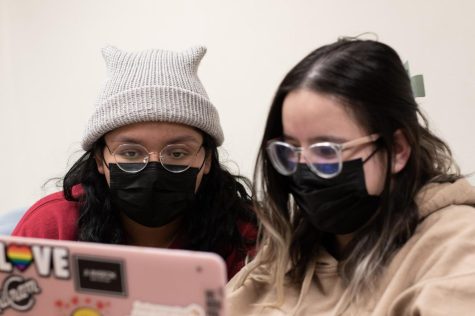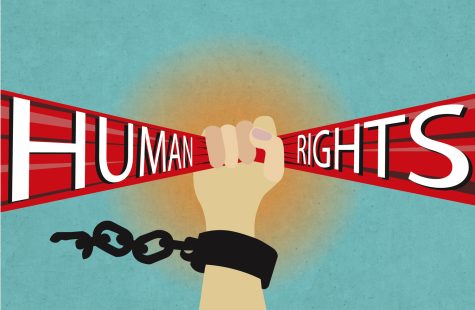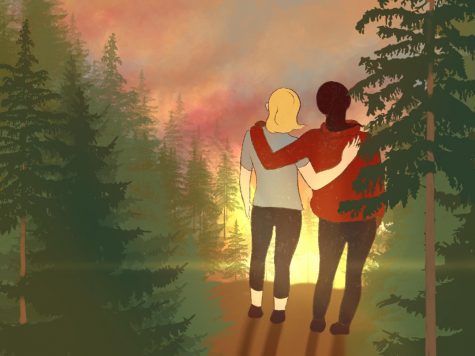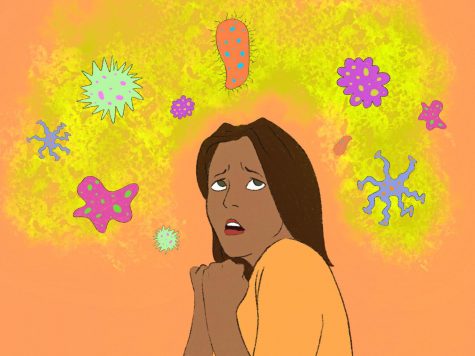COVID-19 vaccine shows hypocrisy of Left
Democrats claim to understand minorities’ distrust of the government yet criticize their response to vaccinations
August 23, 2021
*Editor’s note: One interviewee will remain anonymous to avoid any blowback. Due to extenuating circumstances, the original visual was removed.
In recent years, the Black Lives Matter movement has brought awareness to the abuse of power within the police force.
With the deaths of George Floyd, Breonna Taylor and others, many Americans – most left-leaning politically – began to espouse their understanding of the apparent societal disparities and why a significant number of minorities distrust the government.
However, the people who support the BLM movement and acknowledge the history of minorities are now the same people criticizing minorities for their hesitation about getting the COVID-19 vaccine.
Philip DeFranco, a socially liberal American news commentator who focuses on current political events, criticizes people hesitant about getting the vaccine. He publicly calls them stupid, selfish and ignorant.
For a person who supports the BLM movement, it appears very hypocritical not to acknowledge the relationship between minorities and the federal healthcare system, considering it is a form of government.
One 24-year-old Black male* was very hesitant about getting the vaccine.
“I don’t trust the federal healthcare system,” he said. “The overall treatment and survival rates of Black people in hospitals, for the same illnesses present in white people, is small if a Black doctor isn’t present.”
Specific events in U.S. history have shaped the deep-seated mistrust between minorities and the federal healthcare system. After looking at research done over the decades, it is apparent why minorities have a destructive relationship with the government.
The Tuskegee Study of Untreated Syphilis in the [Black] male – an unethically conducted experiment between 1932 and 1972 by U.S. Public Health Services Commissioned Corps and Centers for Disease Control and Prevention – prompted minorities’ mistrust in the federal healthcare system.
In Tuskegee, Alabama, USPHS enrolled 600 African American males into the study, 399 of them having latent syphilis. The USPHS neglected to inform the participates about their diagnosis and used placebos, ineffective methods and diagnostic procedures as treatment.
The study lasted 40 years, which was 39 years and six months longer than initially proposed. Throughout those 40 years, despite the study losing funding and penicillin becoming widely available to treat syphilis, USPHS and CDC continued the study without informing or treating the participants with syphilis.
After the study concluded, 28 participants died directly from syphilis, 100 participants died from complications related to syphilis, 40 participants’ spouses were infected with syphilis and 19 children were born with syphilis.
Jaime Nolan, associate vice president of WSU Community Equity and Social Justice, described another historical example that prompted minorities’ distrust in the federal healthcare system: the sterilization abuse of minority women.
Between 1933 and 1973, in North Carolina alone, approximately 5,000 out of 7,600 women (65 percent) who were sterilized by the state were African American – which is entirely disproportionate, considering Black people made up 29 percent of the population in 1930 and 22 percent in 1970.
In 1972, the United States Senate testified at least 2,000 involuntary sterilizations had been performed on poor Black women without their knowledge or consent. Many women were also threatened by the removal of welfare benefits unless they consented to sterilization.
“It is also true for Native women and Latina women,” Nolan said. “You would go in for something, and you would be sterilized without even knowing it.”
Nolan notes that if the government supported those research projects, which operated through a framework of racism, then it is really challenging for minority communities to pull those threads apart.
After the 24-year-old male watched his family and others receive the vaccine with no adverse effects, he ultimately decided to get it.
Whereas the rates of vaccinations among minorities were relatively low throughout the majority of the pandemic, recent findings suggest the racial gaps in vaccinations are narrowing throughout the nation, particularly for Hispanic and Black people. In other words, more minorities are getting the vaccine after seeing other members of minority communities with no adverse effects!
In sum, let us stop being hypocritical. The BLM movement and the hesitation of COVID-19 vaccinations are cut from the same cloth.
It is illogical to claim to understand minorities’ mistrust in the government when you do not acknowledge every aspect of the factual history minorities have experienced with the government.
If someone is hesitant about receiving the COVID-19 vaccine, do not automatically label them as close-minded. Instead, consider the history surrounding their community, ask them “why questions” and try to understand their point of view.





















Frank Lazner • Aug 25, 2021 at 1:50 pm
There’s something especially dystopian watching writers capitalize black & leave white lowercase. I recently noticed that CNN, after a considerable period of time only capitalizing black, has opted to finally capitalize both black & white. (Not sure if this will be a consistent standard going forward however.)
I am familiar with the genocidal logic that “whites aren’t a race” (even though they’re routinely referred to and identify as such) and that capitalizing the word would potentially “validate white supremacy”. But if we’re gonna confront the hypocrisy of the left, let’s not enable their psychotic mind-rot revenge fantasies.